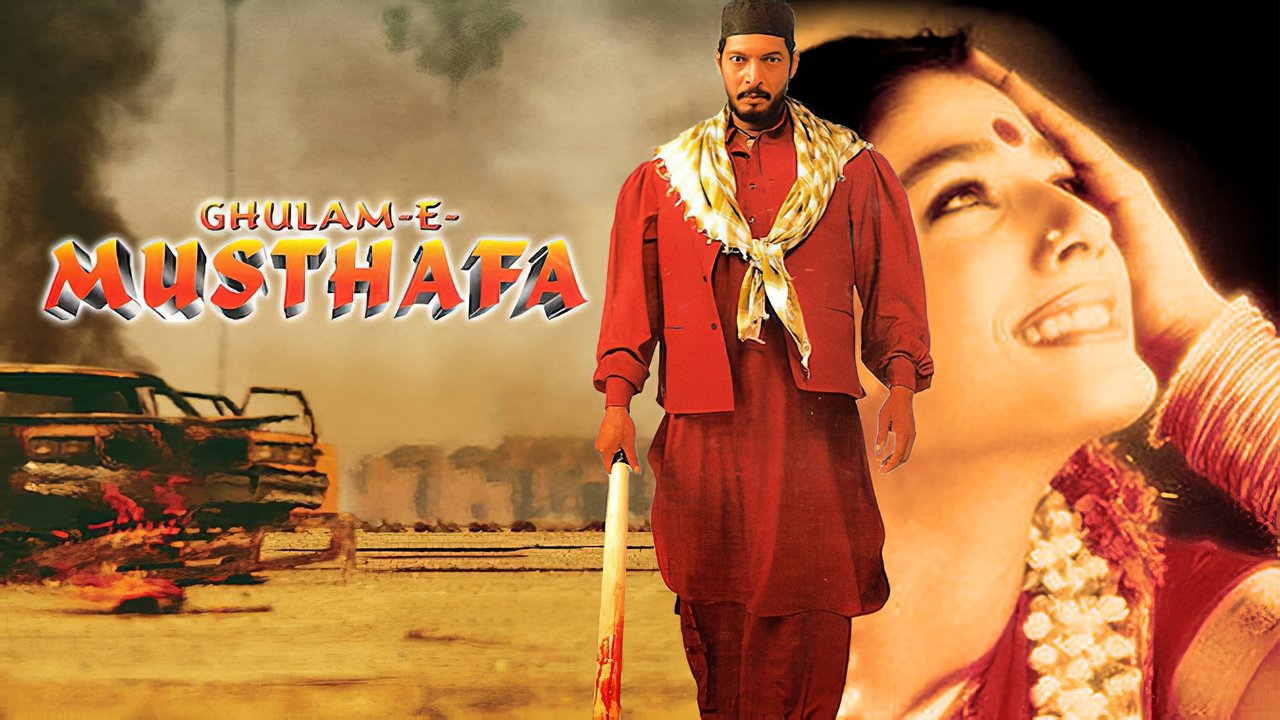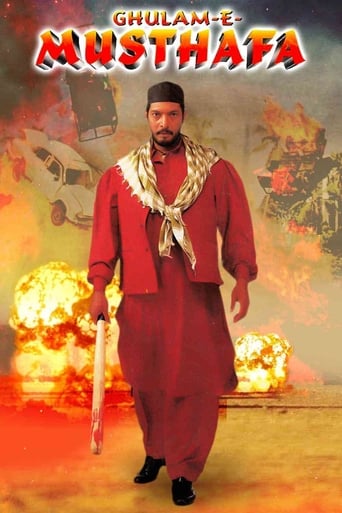Spidersecu
Don't Believe the Hype
TaryBiggBall
It was OK. I don't see why everyone loves it so much. It wasn't very smart or deep or well-directed.
Mischa Redfern
I didn’t really have many expectations going into the movie (good or bad), but I actually really enjoyed it. I really liked the characters and the banter between them.
Sammy-Jo Cervantes
There are moments that feel comical, some horrific, and some downright inspiring but the tonal shifts hardly matter as the end results come to a film that's perfect for this time.
varghesejunior
This is one of Nana's best films ever. If you like Nana Patekar then you should not miss GEM.The story is about a hit-man who goes to any lengths to please his superiors, but soon finds that his activities have begun to affect his near and dear ones too, and he probably will have to change for the better.The acting on Nana's art is the most outstanding thing - no one beats him really. The songs are good but all have a minor scale tone in them, the storyline is good, some action scenes are cool, and so are Nana's dialogs.Hard to find a movie like this nowadays
jmathur_swayamprabha
The movie can undoubtedly be counted among the best movies done by Nana Patekar. This is also one of the better works of the director, Partho Ghosh. The movie has a great deal of emotions and touches the viewer at many places. It not only entertains, but also gives good messages of communal unity and crime never pays.As the name suggests, the story belongs to Ghulam-e-Mustafa (originally the name of the movie was kept Mustafa but due to opposition of certain religious groups, it was changed to Ghulam-e-Mustafa) who is the henchman and right hand of Saanta Prasad (known as Abba among his man and in the underworld). Abba had adopted and fostered him and hence he feels himself indebted to him for life, doing anything he wants Mustafa to do without giving any thought to its propriety or ethicality. He comes in contact with a teacher Kavita who loves him to the extent of becoming his wife despite knowing everything about his past, present and of course, future, without any regrets. But when she is killed in an attempt on Mustafa's life by his enemies (say the enemies of Abba), Mustafa's profound grief proves to be an eye-opener for him. He realises that the violence in which he has been involved for years in the name of Abba's work considering it as his duty, is nothing more than an outright futile and condemnable phenomena which has made him guilty of taking innocent lives. The pain of losing his beloved make him empathise with the pain of his own victims. A thoroughly changed Mustafa leaves the path of violence and Abba's house too. Abba loves him so much that he realises his pain and consequential change in him and therefore let him go his new way. Mustafa now finds his way leading to the house of Dayanand Dixit, an honest govt. officer, unreasonably trapped by an anti-corruption officer and sentenced to imprisonment resulting in the plight of his family containing his wife, son and daughter. Mustafa enters the pain-stricken house of this Hindu Brahman family as a trespasser and imposes himself upon the family members who initially hate him but with the passage of time come to realise that he has come to their house to play the messiah for them. He saves them from all their enemies including the corrupt anti-corruption officer who has his lustful eye on Dixit's daughter. However the main problem is monetary hardship and the honour of the family. He gets an opportunity to solve this problem by making a deal with Abba who wants the services of his beloved ex-henchman back to reap the electoral harvest by unlawful means for a particular political party. Mustafa agrees to do the wrong thing for the last time in his life in lieu of release of Dixit from jail and his exoneration from the false charges levied upon him as well as a job for Dixit's son and monetary help for his daughter's marriage. However he conveys in good faith to Abba that he will surrender to the authorities for his past crimes after the objectives of Abba as well as himself are fulfilled. This communication leads to the unexpected climax of the movie when Mustafa is shot dead by his loving Abba himself to prevent him from arrest and abolish any possibility of exposure of Abba and the politician, Abba is working for.Ghulam-e-Mustafa is a movie in which Nana Patekar shows the depth of his acting talent in the simplest manner. He is an actor par excellence and Ghulam-e-Mustafa demonstrates why he has such a huge fan-following. Raveena Tandon as Kavita is very charming and impressive. She has done a good job despite less footage given to her. The support cast has also done excellently including the villains. Paresh Rawal has acted a difficult character of Nana's mentor who loves him by heart but compelled to eliminate him due to his illegal profession's requirements, proving once more that he is a highly versatile actor who can infuse life in any type of positive or negative character. In Ghulam-e-Mustafa, Paresh's character is neither positive nor fully negative, it is a character with grey shades whose activities are apparently contradictory, yet quite logical. Among other cast, special mention is needed for Shivaji Satam as Dayanand Dixit and Aruna Irani as his wife, Bhagyalakshmi Dixit who have acted their roles with the highest level of sensitivity naturality.The music is not great but very touchy. The songs may not have been chartbusters but their melody and meaningfulness can be easily felt while listening. Lovers of emotional songs should definitely listen to 'Tera Gham, Mera Gham, Ek Jaisa Sanam'. The other aspects of production are also satisfactory. The storyteller has been successful in keeping the viewers glued to their seats throughout the movie and he never lets them down at any point during the narration. Many scenes compel the viewers to clap. Mustafa's refusing the non-vegetarian food sent for him by Abba to respect the sentiments of the Dixit family is an example.Movies like Ghulam-e-Mustafa are like an oasis in desert in these times of communal hatred and biases. Ghulam-e-Mustafa had come much prior to the fateful 9/11. However it's relevance can be felt when watched today. The movie carries both the entertainment value and the inspirational value in good quantum. It shows that anybody can be a good human-being or become a good human
Falconeer
The title "Ghulam-E-Musthafa" translates into "slave of God," and this epic study of one man's inner struggle with his violent upbringing versus his devout religious beliefs, is truly something to behold. Musthafa, as a young street orphan, is adopted by a political crime boss, whom the boy calls Abba, or "father." The Muslim youth is trained to be a killer, and grows into a quiet, lonely man who knows little more than killing, and prayer. A volatile mix, and when a chance encounter with a beautiful nightclub dancer awakens human emotion in Musthafa, he is forced to re-think his life, and how Allah expects him to live. When a car bomb, planted by a rival crime family, takes the life of his woman, Musthafa takes it as a sign from God, and sets about changing his ways. But not before a deliriously stylish and violent revenge is carried out on the men who took the life of his beloved. As with many Bollywood films, "Ghulam-e-Mustapha" is rich with many different genres. Powerful drama, political espionage, and romance go hand in hand with comedy, brutal violence, and... musical numbers! However don't expect a light, sugar-coated film here; this is some serious stuff indeed, and the few music set pieces are cleverly integrated into the film without sacrificing authenticity; those segments are either nightclub performances or fantasy scenes, and the actors don't break out in song, rather the songs are there as a backdrop. The first portion of the film introduces us to the highly developed characters, and sets up the events to come. the second portion, when Musthafa moves into the home of a proud Hindu family, and the struggle that develops over religious beliefs and customs, is both fitfully funny and profoundly touching, and the final portion features some surprising violence, and a shocking ending that you will never forget. This one will be quite a discovery for fans of great, if obscure cinema, and it's topic of Islam is quite timely now. In fact 'Ghulam' serves as a beautiful example, and sheds light on the most misunderstood religion on Earth, by portraying a deeply sympathetic Muslim male, who has a profound love and respect for the lives of others, regardless of religion. In the tradition of DePalma's "Scarface," "Ghulam-e-Musthafa" is an epic tale of violence, power, greed, and redemption.

